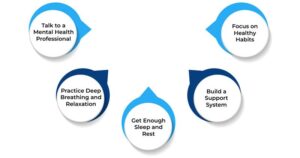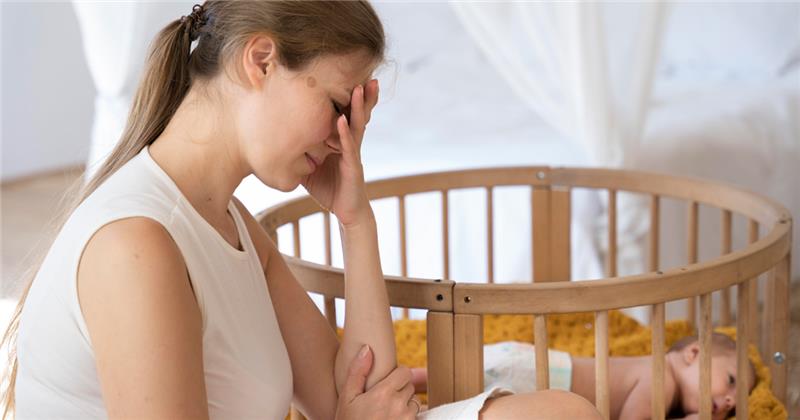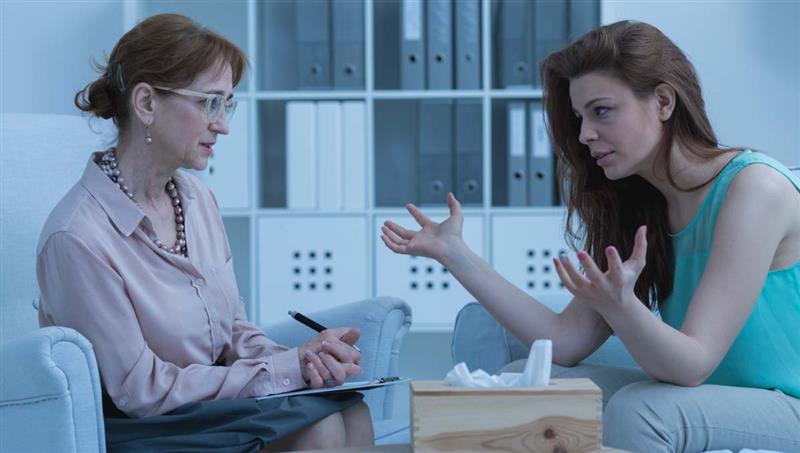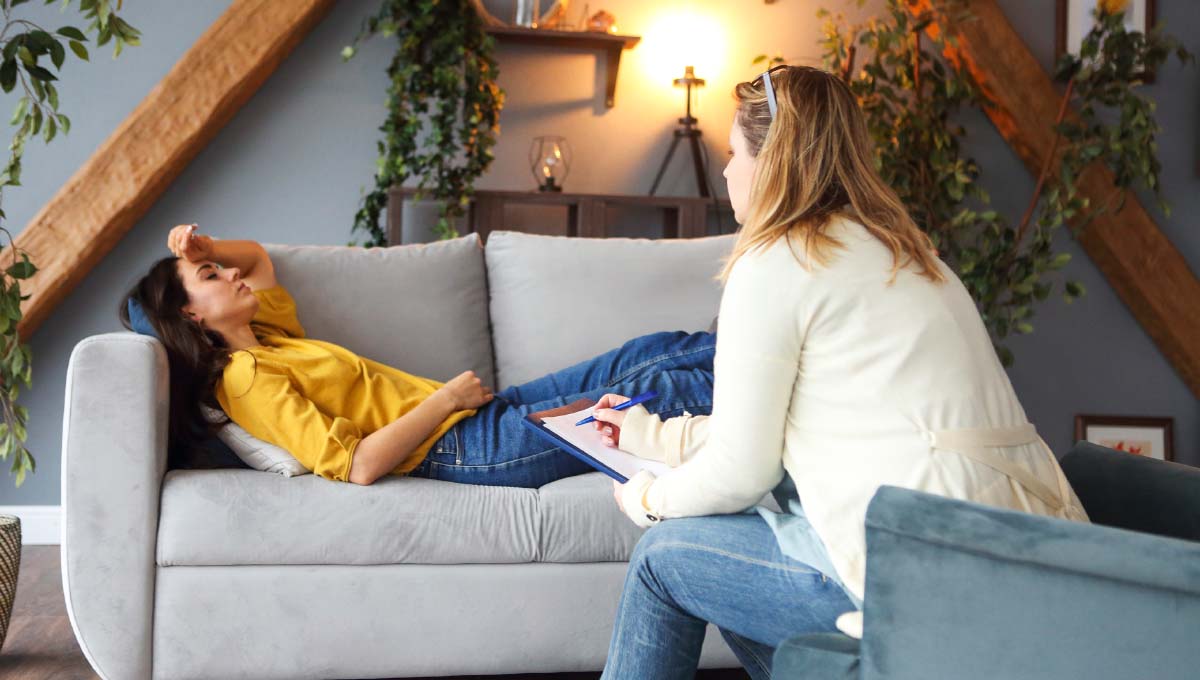When one delivers a baby or takes the role of a parent, it may lead to one experiencing a state of anxiety or nervousness, and this is what is known as postpartum anxiety. It is common to worry a little when a baby is born, but postpartum health anxiety is stronger and cannot be controlled easily. The anxiety can also continue with you during the day and till nighttime, and one can either sleep or experience a calm feeling. You may become overly protective of your newborn, be a housewife, or even fear being left alone with your infant.
In certain instances, such sensations can be connected to past incidents or abuse, but in other cases, they can occur without any explanatory cause. You can be agitated, trembling, faint, or short of breath. Are you experiencing this condition? If so, you may contact us at MAVA Behavioral Health. Our mental health professionals are ready to help you get through this rough patch.
What Is Postpartum Anxiety?
Postpartum anxiety is an anxiety condition that some women experience after birth. It is made up of worry, fear, or nervousness, and this happens most of the time with no particular reason at all. The mothers, who are suffering from postpartum anxiety, may feel that things are overwhelming, they cannot sleep, or they worry about the state and safety of their newborn child to the extent that it is too much. The feelings can sabotage their own lives and make motherhood not that fun.
Furthermore, it is not the usual pressure that comes about when one has to have a new baby. The postpartum health anxiety can be intense and can last a long time. You need to know that it is not their mother who is the reason, and that there is something to help. Certainly, it is a good step to talk to a doctor, therapist, or support group to feel good and enjoy living with the baby.
Postpartum Anxiety Symptoms
The following are typical symptoms of postpartum anxiety:
- Casual or extreme worry, particularly about the safety or health of the baby
- Itching, tightness, or anxiety, unable to settle down
- Difficulty falling asleep or maintaining sleep, despite the baby sleeping
- Uncontrollable thoughts that come at a fast rate
- Experiencing muscle aches, shakiness, or feeling tense
- Fear of going to some places or situations, or doing anything
- Poor attentiveness or paying attention
Postpartum Anxiety at Night
The symptoms of postpartum anxiety at night are unbearable. You may still be thinking whilst you are trying to sleep, and the baby is asleep too. There is a good possibility that you may experience intense fear or worry even in situations where there is no apparent reason. Sleep disturbance, waking up in a panic, difficulty falling asleep, visiting the baby often, and feeling that something terrible could happen to the baby are some of the common signs of postpartum anxiety.
In others, the worry might be related to postpartum separation anxiety, or fear of being separated even temporarily, from your baby. You may fear leaving the baby with another individual, or worry when your baby is out of the room. These are strong feelings that can be treated. However, with appropriate assistance, e.g., therapy or medications, most parents start to improve. When you need some dedicated, professional assistance and have problems with anxiety at night, you may call MAVA Behavioral Health and have a caring person who will help you.
How To Deal with Postpartum Anxiety?

1. Talk to a Mental Health Professional
The discussion with a psychotherapist, counselor, or psychiatrist will assist you in discovering your anxiety and learning to cope with it. They will be able to assist you in getting your thoughts organized and provide you with some skills that can be used to help you cope. Medication may also be prescribed in case such is necessary. One of the best things to put oneself in a better state is the support of a professional.
2. Practice Deep Breathing and Relaxation
When you have anxiety and you are brimming with anxiety, deep breathing relaxes both your body and your senses. Take deep and slow breaths in and out, and concentrate on breathing. Lifestyle can include relaxation and reducing stress daily.
3. Get Enough Sleep and Rest
Sleep is associated with your physical and mental wellness. When your baby is taking a nap, take your chance to sleep as well and seek the assistance or support of relatives or friends. A lack of sleep can aggravate anxiety disorders; hence, even small naps are useful. Do not take caffeine at bedtime, and avoid any relaxation rituals before bedtime. Looking after your body makes your mind strong.
4. Build a Support System
Talk to your partner, family, or friends about how you feel. Explain to them how you need their help and whether it will be emotional support you need or if they will be tending to the baby. It is possible as well to get less lonely and to become an evaluator of a new parent group or a post-pregnancy support group. It can be a healing process to share with others. You do not need to do it by yourself.
5. Focus on Healthy Habits
It would allow balancing meals, intake of water, and exercising to make you feel good and energetic. This may be as easy as going out to take a walk, and it can work to change your mood. Avoid alcohol and limit caffeine consumption as they raise levels of anxiety. Try to adhere to a daily schedule with room to make time to take care of oneself. Small healthy lifestyles mean massive improvements to your health.
Postpartum Anxiety Treatment
How to treat postpartum anxiety? Postpartum anxiety may involve therapy and/or medication to be treated. Communication with the mental health specialist can help you control your thoughts and emotions. Medication can also be used effectively in the treatment of postpartum anxiety.
In extreme situations, the physicians might administer some medicines that are safe to treat the symptoms of anxiety. Recovery is also supported by self-care, relaxation, and sleeping adequately. Attending support groups and developing an adequate support system can go a long way. When you are anxious and you have issues such as postpartum health anxiety, refer to MAVA Behavioral Health and find the best care and guidance.
1. Postpartum Anxiety Test
A postpartum anxiety test helps you determine whether you could be affected by anxiety symptoms after giving birth. Every once in a while, it consists of a series of questions regarding what you are thinking, feeling, and acting since becoming a parent. The Litmus test aids you in knowing whether you are experiencing more than a little bit of fresh-parent stress.
The first step in getting the support you need is to take the test. In case you are overwhelmed or experiencing anxiety following a birth, do not hesitate to have a conversation with someone who can empower you. You may also visit MAVA Behavioral Health to receive a professional assessment and treatment.
2. Medication For Postpartum Anxiety
The following are the usual categories of drugs to be applied in the treatment of postpartum anxiety:
- Serotonin-Norepinephrine Reuptake Inhibitors (SNRIs): Administered when SSRIs are ineffective or have side effects.
- Short-term benzodiazepines: They might include the prescription of short-term benzodiazepines to obtain instant relief from the severe symptoms of anxiety.
- Beta-blockers: Assist in controlling such physical symptoms as a racing heart or shaking.
- Anti-anxiety drug (non-benzodiazepine): There is a chance of safe use under professional supervision.
- Ask a doctor: Your doctor will decide which medication to take based on your symptoms, your health history, and any breastfeeding.
Final Thoughts
The feeling of dealing with postpartum anxiety is overwhelming, and with the help of support, a person can recover. At MAVA Behavioral Health, we provide caring and individualized treatment of postpartum anxiety disorders, with safe and effective medication-based management. We have providers who skillfully investigate your symptoms, personal health history, and personal needs in order to design the most optimal treatment plan to suit you.
Are you experiencing constant worry, panicking, or postpartum anxiety of separation? You do not have to feel alone. Here is our way of helping you regain your composure and enjoy your parenthood. You are not alone; you can call and receive support and healing.
FAQs
What is postpartum health anxiety?
Postpartum health Anxiety is when a postpartum caregiver is always anxious about their physical well-being or the health of the child born. These concerns can be intense or uncontrollable, even when a doctor may say that everything is alright.
Is it normal to get anxious after the birth?
Yes, after childbirth, it is natural to experience certain anxiety. However, when it is persistent or when it impacts negatively on your day-to-day life, or when it is too overwhelming, then it is postpartum health anxiety and needs to be taken care of.
What are the usual symptoms of postpartum health anxiety?
Some symptoms determine this problem, such as excessive health checks of the baby, racing thoughts or danger thoughts, problems in sleeping, panic attacks, as well as seeking constant affirmation from others.
What are some of the ways of treating postpartum health anxiety at home?
Some of the measures you may consider involve performing deep breathing and mindfulness training, conversation with loved ones, reducing the number of searches on the internet about health, and sticking to a schedule. Nevertheless, when the symptoms persist, it is advised to seek professional assistance.
How do I know when to get some treatment for postpartum health anxiety?
In case your anxiety does not subside, disturbs the process of sleeping, or causes concern about how to care for your baby, you should consult it. Get in touch with MAVA Behavioral Health to address your condition.









